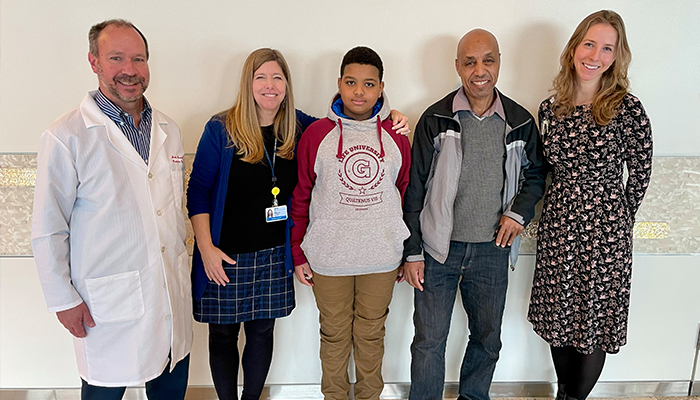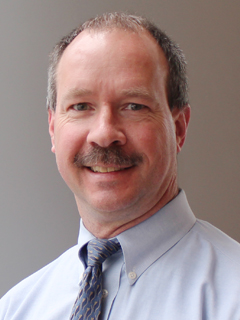HOW CAN WE HELP YOU? Call 1-800-TRY-CHOP
In This Section
CHOP Surgeon Performs First Gene Therapy in Clinical Trial for Hereditary Hearing Loss

Dr. Germiller (left) and team are all smiles with Aissam (center), the 11-year-old patient who received the first gene therapy procedure for hereditary hearing loss performed at CHOP.
mccannn [at] chop.edu (By Nancy McCann)
Horns honking, a hospital elevator's hum, a parent's voice — everyday sounds common to most of us — are brand new to an 11-year-old clinical trial participant who received the first gene therapy procedure for hereditary hearing loss performed at Children's Hospital of Philadelphia.
This milestone represents an important step in possible treatment options for patients around the globe with hearing loss caused by genetic mutations, as well as marking another scientific advance for gene and cell therapy.
"Gene therapy for hearing loss is something that physicians and scientists have been working toward for over 20 years," said John Germiller, MD, PhD, an attending surgeon and director of Clinical Research in the Division of Otolaryngology at CHOP. "While the gene therapy we performed in our patient was to correct an abnormality in one, very rare gene, these studies may open the door for future use for some of the over 150 other genes that cause childhood hearing loss."
CHOP is one of four clinical trial sites in the world participating in this Phase I/Phase II clinical research trial of AAVAnc80-hOTOF gene therapy sponsored by Akouos, a precision genetic medicine company. It is being conducted to determine safety, dosage, effectiveness, and side effects, in collaboration with Dr. Germiller, Ian Krantz, MD, director of the Roberts Individualized Medical Genetics Center in the Division of Human Genetics, and the Clinical In Vivo Gene Therapy group at CHOP, a multidisciplinary team of experts committed to advancing transformative human therapies and CHOP's leadership in gene therapy.
Otoferlin Gene
The clinical trial is focused on a rare form of genetic hearing loss due to a mutation in the otoferlin (OTOF) gene, which provides instructions for the body to make otoferlin, a protein necessary for hearing. Without functional otoferlin protein, sounds cannot be communicated from the ear to the brain, resulting in hearing loss. But with normal OTOF genes, the sensory cells function correctly so they can respond to sound and activate the auditory nerve to send impulses to the brain.
In October 2023, Dr. Germiller performed the first minimally invasive surgical procedure at CHOP where he placed a single, small dose of functioning OTOF genes encased in a viral vector — a modified form of a non-disease-causing virus — into cells of the cochlea in the 11-year-old's inner ear.

John Germiller, MD, PhD
"This is the first injectable treatment of the inner ear for hearing loss," said Dr. Germiller, who helped with the initial design of the delivery device, a specialized probe needed to get the right angles for inserting this gene therapy into the "round window," an area of only a millimeter in diameter that leads to the cochlea.
After the procedure, the patient's hearing improved. Dr. Germiller compared his current level of hearing to having earplugs in — he can hear, just muffled. Prior to the procedure, he was completely deaf and didn't even know what sound was.
This trial has so far proven that the concept of gene therapy for human hearing loss is not only feasible, but also that it is possible for complete deafness and for deafness from birth. The researchers will continue their work to study how long the hearing improvement will last and if any side effects appear.
"As more patients at different ages are treated with this gene therapy, researchers will learn more about the degree to which hearing is improved and whether that level of hearing can be sustained over several years," Dr. Germiller said. "What we learn from following this first patient's progress will help direct our efforts toward helping as many patients as we can."